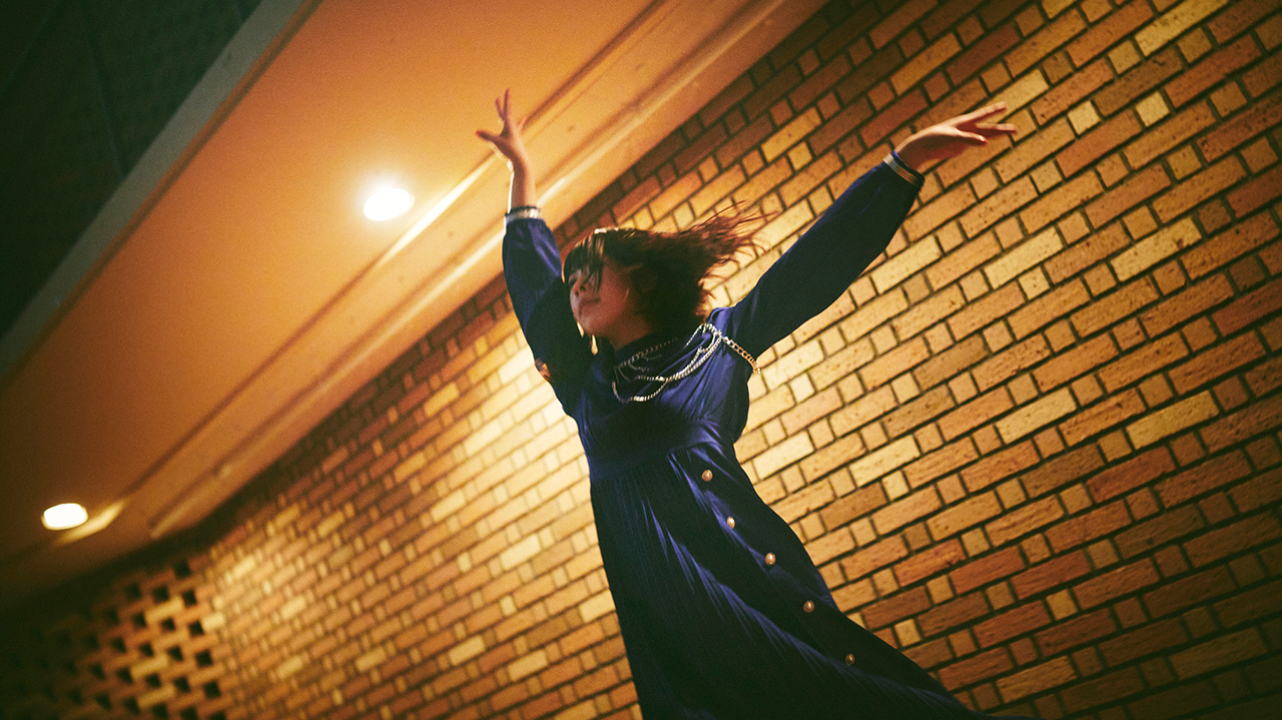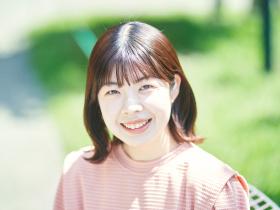Worrying, but continuing to think, is the person I am
Moe Takeda spent her student years keeping in mind something a junior high school teacher told her: “Blossom where you’re planted.” These words supported her, she says, and provided her with a guideline for life. In this article, Ms. Takeda tells us how during her time at Meiji Gakuin she reconsidered and become aware of what kind of person she is.


Moe Takeda
Fourth-year student, Department of Sociology, Faculty of Sociology
Moe Takeda is involved with the dance club “Break Jam” and the volunteer group “Pocket.” She has been a Genre Representative and a Part Leader in Break Jam, and through Pocket she provided educational support in Cambodia. She has loved dance since she was very young, both as an observer and as a dancer herself. She aspires to be like a Disney princess: elegant, but with a core of strength.
-
Getting deep into ballet
One of my strong points is that I have clear goals, and I work straight toward them. Conversely, my weak point is that I don’t want to do anything else. My mother even once said to me, “It’s like you’ll die if you aren’t doing something you love.”
One of those things is dance. When I visited Disneyland when I was young, I liked the shows more than the rides. When I watched children’s shows on television, I would sing along with the host, like I was putting on a concert. That’s the kind of kid I was.
Due to my father’s work, from age four I spent three years in China, then three years in Japan, then another three years in China. I first encountered classic ballet in China. Wanting to continue dancing after I returned to Japan, I visited a modern ballet studio near where I lived. I went in jeans, intending to just watch, but I ended up participating in the lesson until the very end. I’ve been enthralled with it ever since. In elementary school I was practicing ballet every day, which kept me so busy I found myself doing homework while eating meals, half asleep. I didn’t resent not having any time to play with my friends; instead, I only felt frustration at not being a better dancer than I was, and at what felt like a lack of progress. Looking back, I can definitely say I’ve never experienced anything more painful, nor anything I’m prouder of.
Discomfort overseas
I lived in China for a total of six years, and what I felt and experienced there has greatly impacted my life today. When learning ballet in China my teachers and fellow students were Chinese, so there was of course a language barrier. We use the same French ballet-related terms in both Chinese and Japanese, however, and dance is more about sensibility than language, so I was able to somehow get by.
But there were also things I well remember as having made me uncomfortable, like seeing other kids my age having to work, selling souvenirs to tourists. I loved school, and going to school just seemed like something everyone did. As young as I was, I thought they should all just go to school.

What I wanted to do in college
From my past experience, I knew I wanted to be involved in dance and in providing support for education, and those factors were the measure by which I evaluated prospective colleges. At around college entrance exam season, I happened across a YouTube video showing the Meiji Gakuin dance club “Break Jam” winning the Japan Dancers’ Championship (JDC), which for me decided where I wanted to go to school. I also joined the volunteer group “Pocket.”
In my first year, I particularly spent a lot of time working with Pocket, through which I went to Cambodia as a volunteer to provide educational support at children’s shelters and elementary schools. I was in charge of a class called “Imagination Sharing.” While the students had classes in English and math, they didn’t have regular health or ethics classes. Imagination Sharing was something like ethics, in that we would read picture books and exchange opinions about what we’d read. The children I taught had little experience communicating their opinions and values to others, and I was struck by how unfamiliar doing so seemed to them.
One day at a children’s shelter, I read a book with the line “Guess how much I love you — I love you right up to the moon — and back.” I asked the children if there was someone they loved that much, and they came back with answers like “My dad” and “My mom.”
That night at a review meeting with the others in my group, we talked about how maybe it would be best not to ask that question, because shelters are home to children from a variety of backgrounds, and we can’t assume they all have parents. Such contact with the children gave me constant opportunities to think, and even more opportunities to reflect.
Educational support in Japan
I was mostly interested in international issues when I started college, so I had some hesitation about choosing the sociology department. To be honest, I regretted that choice at first. I think I was influenced by the fact that many Pocket members were in the Faculty of International Studies.
At around that time, however, I took a class called “Introduction to Multiculturalism,” and after learning about the challenges that foreign residents of Japan face, I came to feel that I could address international issues even from within Japan. While my activities with Pocket were meaningful, I felt the limits on what a single college student could achieve. I thus decided to take a volunteer practicum as part of my Department of Sociology studies to obtain certification as a “Multicultural Facilitator” upon graduation. This certification program is part of Meiji Gakuin’s “Inner Internationalization” project.
In the practicum, we experienced educational support for Syrian refugee students living in Japan. When I first met them, many students were very talkative and spoke excellent Japanese, so I wasn’t sure what kind of support they might need. What I gradually realized, however, was that despite being able to speak Japanese they for example couldn’t solve math problems, that they didn’t know the Japanese necessary to solve math problems. Furthermore, I was working with different students each time, and each of course had a different personality, a different way of thinking, and a different level of understanding, making it very difficult to understand and respond to each one.
So while my experience in Cambodia made me conscious of the limitations on what a single university student can accomplish, making me start to question volunteering itself, this experience helped me realize what I was capable of, even as a mere university student.

Japan Dancers’ Championship
Regarding the other thing I wanted to do, dance, I also became seriously engaged with Break Jam, and in my second year, one of my seniors nominated me to be team representative for the “Jazz” genre. Many Break Jam members are very talented dancers aiming to go pro in the future. I therefore wondered why I was the one who got nominated, but I decided to make proving myself as worthy of that nomination my goal for that year. The COVID-19 pandemic prevented us from doing everything we wanted, and some members even quit the club. But that allowed me to realize and sympathize with the motivation and efforts of those members who stayed on, and I did my best to remain in a neutral position from which I could share what I’d found with the other members.
When we participated in the JDC, I was given the position of Part Leader. Compared with other club activities, there’s something completely different about the atmosphere at the JDC. Our club would be represented by a team of selected dancers, and it would be my responsibility to choose who would be competing. I also felt enormous pressure in another sense: the other Part Leaders were all truly amazing dancers and obvious choices for the genre they’d be in charge of, so I doubted whether I was really good enough.
But I decided to focus on my strengths, to be sure I wouldn’t be left harboring regrets after the competition was over. In particular, as Part Leader I took on all the tedious roles, like implementing extensive infection prevention measures to ensure that nobody suffered as a result of their participation, leaving tasks like choreography and song selection to those who are best at them. Above all else, I focused on the goal I had set, namely participating in the JDC, and winning.
In the end, we won the Japan Dancers’ Championship 2022. I managed to reproduce the same scene I’d watched on YouTube when I was in high school.
The person I am
At first glance, I think many people might consider Break Jam as somewhat intimidating and unapproachable. I felt the same way at first. But the truth is it’s a very welcoming group, and we have a lot of respect for each other. We’ve established relationships where we can express our own personalities while still having respect for others. That’s what allows us to create a stage that features varying genres and distinct personalities, while still maintaining a sense of unity. I’m confident that this is what allowed us to win the JDC. I also believe that this sense of mutual respect is the atmosphere at Meiji Gakuin.
In my first year in junior high school, my teacher told me I should “blossom where I was planted.” Thankfully, Meiji Gakuin is a place where I can blossom to my fullest extent. Even at the many times I found myself facing uncertainty or doubt, I was able to go on thinking about how I could shine in this place. I also feel that I was able to arrive at that answer on my own, with the aid of my family, friends, teachers, and other club members.
In the future, I plan to utilize my experience living abroad to pursue a career in the hospitality industry, working in different environments and situations to bring people together. I’m sure I’ll keep worrying and wondering, thinking about how I can do my best. That’s the kind of person I am.
Regardless, I will travel a path I choose for myself, recalling time and time again my experiences at Meiji Gakuin, and that I should bloom where I’m planted.

